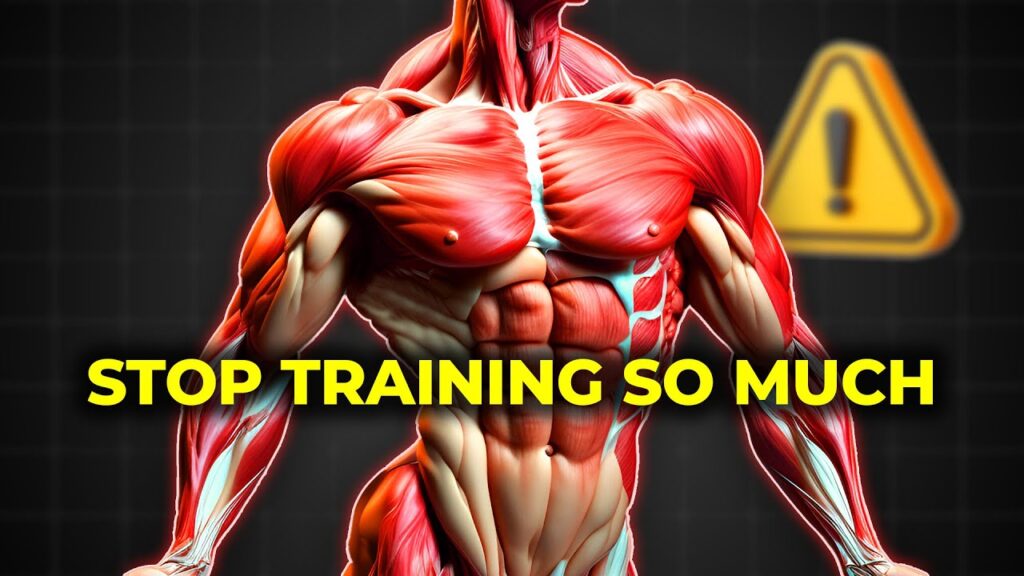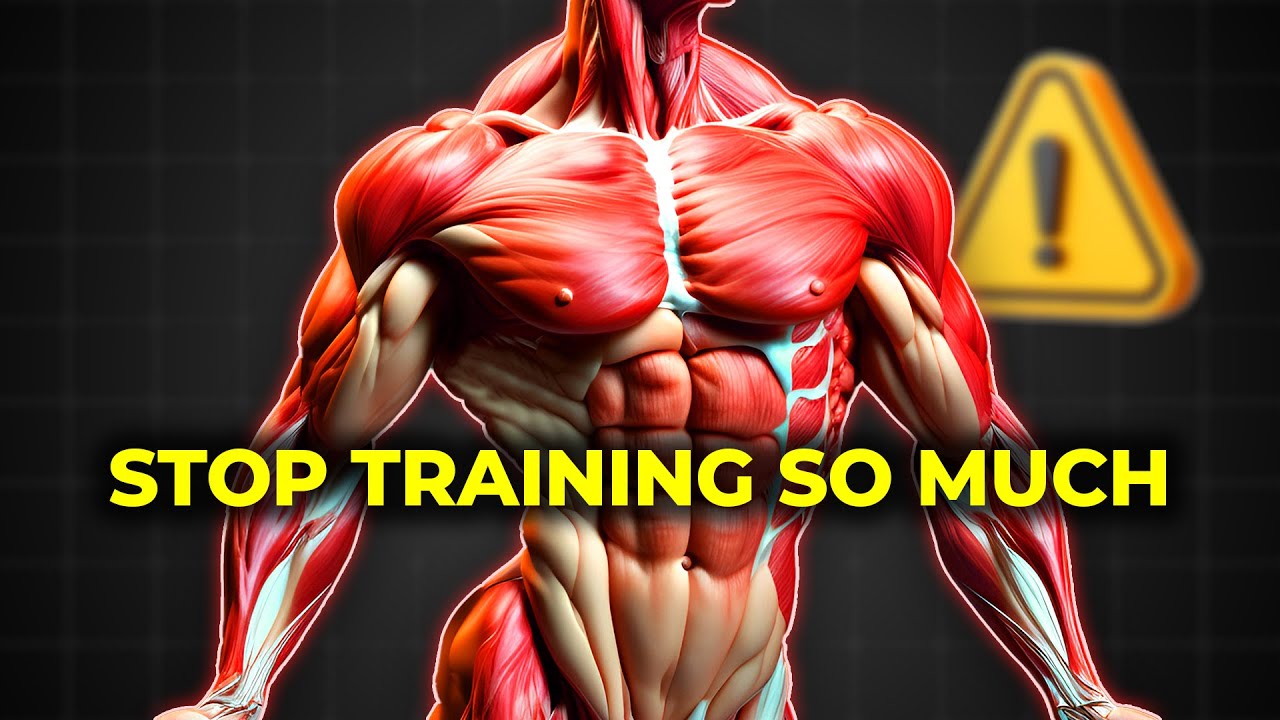In the video by Body Hub titled “Crucial Things You MUST Do if You’re Not Seeing Gains,” they provide valuable insights and tips for individuals struggling to see muscle growth. The video emphasizes the importance of proper nutrition and eating enough calories, mentioning the significance of hitting macronutrient ratios and doing a complete diet overhaul. Additionally, Body Hub offers two easy tricks to amplify muscle-building efforts and highlights the importance of exercising and maintaining a healthy diet for building muscle. By following the advice provided in this video, viewers can expect to see significant improvements in their muscle growth within 30 days.
One of the key aspects discussed in the video is the importance of calorie intake. Body Hub suggests using the BMR calculator to determine the amount of calories needed daily, with a goal of achieving a calorie surplus for muscle growth. They also emphasize the significance of eating smartly by following a macro ratio of 30% protein, 50% carbs, and 20% fats for optimal muscle growth. In addition to proper nutrition, Body Hub stresses the importance of staying hydrated, consuming post-workout shakes with protein and creatine, and fueling the body with balanced meals. By incorporating these crucial changes into their routine, individuals can overcome plateaus and see the muscle gains they desire.
Importance of Proper Nutrition
Proper nutrition is crucial for muscle growth and overall health. In order to see gains in muscle size and strength, it’s important to eat the right foods and consume enough calories to fuel your workouts and support muscle recovery. By following a balanced diet that includes the right amount of macronutrients, you can optimize your muscle-building efforts and achieve your goals.
Eating right and enough is important for muscle growth
One of the main reasons why your muscle may not be growing is simply because you aren’t eating enough or you aren’t eating the right foods. The human body requires a certain amount of calories to maintain its current weight, known as the Basal Metabolic Rate (BMR). To gain muscle, you need to consume more calories than your BMR. This can be calculated using a BMR calculator, which takes into account factors such as weight, age, muscle mass, and activity level. By adding 500 calories to your BMR, you can determine the number of calories you should be eating daily to promote muscle growth.
Calculate calorie intake using the BMR calculator
The BMR calculator is a useful tool for determining your daily calorie requirements. Once you have your BMR figure, adding 500 calories to it will give you the number of calories you should be consuming daily to gain weight and build muscle. It’s important to note that the quality of calories is just as important as the quantity. Consuming the right foods will greatly aid in muscle growth and prevent excess body fat.
Follow a macro ratio of 30% protein, 50% carbs, and 20% fats
In addition to consuming enough calories, it’s crucial to pay attention to your macronutrient ratios. Protein, carbohydrates, and fats are the three main macronutrients that your body needs in the right proportions for optimal muscle growth. The recommended macro ratio for muscle growth is typically 30% protein, 50% carbs, and 20% fats. This means that 30% of your daily total calories should come from protein, 50% from carbs, and 20% from fats. By distributing these amounts over six to seven meals per day, you can ensure that your body is getting the proper nutrition it needs to support muscle growth.
Benefits of Eating Six Meals a Day for Muscle Growth
Eating six meals a day, rather than the traditional three, can have numerous benefits for muscle growth. In addition to providing your body with a steady supply of nutrients throughout the day, frequent meals can also help to regulate blood sugar levels, prevent muscle breakdown, and enhance muscle recovery.
Gaining muscle has various health benefits
Gaining muscle not only improves your physical appearance, but it also has various health benefits. One of the key benefits of gaining muscle is the increased calorie burn. Muscle tissue is metabolically active, meaning it burns more calories at rest compared to fat tissue. This can help to boost your metabolism and aid in weight management.
In addition, building muscle can enhance insulin sensitivity. Resistance training and muscle building have been shown to improve insulin sensitivity, which is beneficial for maintaining stable blood sugar levels and reducing the risk of type 2 diabetes. Furthermore, gaining muscle can improve bone health, promote joint support, and increase strength and power. These benefits contribute to overall physical well-being and can greatly enhance athletic performance.

Meal Frequency and Muscle Growth
Meal frequency plays a crucial role in muscle growth. By eating at least six meals a day, you can ensure that your body is constantly supplied with the nutrients it needs to repair and build muscle tissue.
Why eating six meals a day is beneficial for muscle growth
Eating frequent meals throughout the day helps to maintain a positive nitrogen balance in the body. Nitrogen is a key element in protein synthesis, which is the process by which your body builds and repairs muscle tissue. By providing your body with a constant supply of protein and other nutrients, you can support muscle protein synthesis and optimize muscle growth.
Additionally, eating frequent meals can help to regulate blood sugar levels and prevent muscle breakdown. When you go for long periods without eating, your body can enter a catabolic state, where it starts to break down muscle for energy. By eating more frequently, you can keep your body in an anabolic state and promote muscle growth.
How meal frequency affects metabolism and muscle protein synthesis
In addition to supporting muscle protein synthesis, frequent meals can also have a positive impact on metabolism. When you eat, your body goes through a process called the thermic effect of food, where it burns calories to digest and process the nutrients from your meal. By eating more frequently, you can increase the thermic effect of food and boost your metabolism.
Furthermore, consuming protein at each meal can maximize muscle protein synthesis. Protein is made up of amino acids, which are the building blocks of muscle. By providing your body with a steady supply of amino acids throughout the day, you can optimize muscle protein synthesis and promote muscle growth.
Pre-Workout Meals
Pre-workout nutrition is essential for fueling your body and maximizing your performance during workouts. By consuming the right foods before your workout, you can enhance your energy levels, improve muscle endurance, and prevent muscle breakdown.
Importance of pre-workout nutrition
Pre-workout nutrition provides your body with the energy it needs to perform at its best during workouts. By consuming the right combination of carbohydrates, protein, and fats, you can ensure that your body has the necessary fuel to power through your training sessions.
Carbohydrates are the body’s preferred source of energy during intense exercise. Consuming complex carbs before your workout can provide a slow and steady release of energy, allowing you to sustain your performance throughout your workout. Protein is important for muscle repair and recovery, while fats can provide a source of sustained energy and help with hormone production.
Benefits of consuming complex carbs before workouts
Complex carbohydrates, such as whole grains, oats, and sweet potatoes, are a great choice for pre-workout meals. These carbs take longer to digest and provide a slow and steady release of glucose into the bloodstream. This helps to maintain stable blood sugar levels and prevent energy crashes during your workout. Consuming complex carbs before your workout can also help to replenish glycogen stores in the muscles, which can improve muscle endurance and prevent muscle fatigue.
In addition to complex carbs, it’s also important to include some protein and a small amount of healthy fats in your pre-workout meal. Protein can help to support muscle repair and prevent muscle breakdown during your workout, while fats can provide a source of sustained energy.

Post-Workout Nutrition
Post-workout nutrition is crucial for the recovery and repair of your muscles. By consuming a balanced meal or shake after your workout, you can replenish glycogen stores, support muscle protein synthesis, and enhance recovery.
Fueling your body with a balanced meal after workouts
After your workout, it’s important to refuel your body with a balanced meal that contains both carbohydrates and protein. Carbohydrates are necessary for replenishing glycogen stores in the muscles, which can improve recovery and prevent muscle fatigue. Protein is essential for muscle repair and growth, as it provides the necessary amino acids for building and repairing muscle tissue.
A balanced post-workout meal could include a lean source of protein, such as chicken or fish, along with a serving of complex carbohydrates, such as brown rice or quinoa. Including some vegetables and healthy fats, such as avocado or olive oil, can also provide additional nutrients and support overall health.
Benefits of consuming a post-workout shake with protein and creatine
In addition to a balanced meal, consuming a post-workout shake can provide your body with quick and easily digestible nutrients. A post-workout shake should ideally contain a combination of protein and carbohydrates, as well as additional supplements such as creatine.
Protein powder is a convenient and effective way to ensure that you’re getting enough protein after your workout. Whey protein is a popular choice, as it offers a complete amino acid profile and is quickly absorbed by the body. Adding creatine to your post-workout shake can also be beneficial, as creatine helps to replenish ATP stores in the muscles, leading to increased strength and power.
By providing your body with the right nutrients after your workout, you can maximize muscle recovery, reduce muscle soreness, and support muscle growth.
Importance of Hydration
Staying hydrated is essential for muscle growth and overall health. Water is involved in numerous bodily functions, including nutrient uptake, temperature regulation, joint lubrication, and waste removal.
Stay hydrated and drink enough water for muscle growth
When it comes to muscle growth, hydration is key. Water is needed for various processes in the body, including protein synthesis, which is essential for building and repairing muscle tissue. Dehydration can impair muscle function and performance, as well as hinder muscle recovery.
It’s important to drink enough water throughout the day, especially before, during, and after your workouts. For optimal hydration, aim to drink at least 8 cups (64 ounces) of water per day, and increase your intake if you’re exercising or in hot weather. If you sweat excessively during your workouts, you may need to replenish electrolytes as well.
Remember to listen to your body and drink water when you’re thirsty. Proper hydration is crucial for muscle growth and overall well-being.

Breathing and Coordination
Proper breathing and coordination are often overlooked aspects of weightlifting, but they play a crucial role in muscle activation and performance. By learning to breathe and coordinate your breathing with your lifts, you can optimize your form, enhance muscle engagement, and prevent injuries.
Breathe and coordinate your breathing with your lifts
When performing weightlifting exercises, it’s important to breathe properly to maximize your performance. Proper breathing technique involves inhaling before the exertion phase of the lift and exhaling during the exertion phase. This helps to stabilize the core and increase intra-abdominal pressure, which can enhance stability and prevent injuries.
In addition to breathing, coordination is also important for muscle activation. By focusing on the mind-muscle connection, you can ensure that you’re engaging the targeted muscles throughout the lift. This can help to optimize muscle activation and promote muscle growth.
It’s important to practice proper breathing and coordination techniques during your workouts to maximize your performance and prevent injuries. By incorporating these techniques into your training routine, you can enhance your muscle-building efforts and achieve better results.
Rest and Recovery
Rest and recovery are often overlooked aspects of muscle growth, but they are crucial for optimal results. By prioritizing rest and recovery, you can allow your muscles to repair and grow, reduce the risk of overtraining, and optimize your overall performance.
Rest and recover adequately for optimal muscle growth
Rest is an essential component of the muscle growth process. When you work out, you create small tears in your muscle fibers. It’s during the rest and recovery period that these tears are repaired and the muscles grow stronger and bigger. Without adequate rest, your muscles won’t have time to recover and grow, which can hinder your progress.
It’s important to listen to your body and give yourself enough time to recover between workouts. This includes taking rest days, getting enough sleep, and practicing active recovery techniques, such as foam rolling and stretching. By allowing your body to rest and recover, you can optimize muscle growth and prevent overtraining.
The importance of getting enough sleep
Sleep is a crucial component of rest and recovery. During sleep, your body produces growth hormone, which is essential for muscle repair and growth. Lack of sleep can hinder muscle recovery and lead to decreased performance and increased risk of injury.
It’s recommended to aim for seven to nine hours of quality sleep per night for optimal muscle growth and overall well-being. Establishing a consistent sleep schedule, creating a sleep-friendly environment, and practicing good sleep hygiene can help to improve the quality and duration of your sleep.
By prioritizing rest and getting enough sleep, you can support muscle growth, enhance recovery, and maximize your performance in the gym.
Targeted Muscle Growth
While overall muscle growth is important, it can also be beneficial to focus on specific muscle groups to achieve a balanced physique. By incorporating targeted training techniques into your workouts, you can stimulate muscle growth in specific areas and enhance the overall aesthetics of your physique.
Consider specific training for targeted muscle growth
If you have specific areas of your body that you want to improve, it can be helpful to incorporate specific training techniques into your workouts. This could include exercises that target specific muscle groups, such as bicep curls for arm growth or squats for leg development.
In addition to specific exercises, you can also modify your training variables to focus on specific muscle groups. This could include using different grips, angles, or tempos to target specific muscles more effectively.
It’s important to remember that overall muscle growth should still be a priority, but incorporating targeted training techniques can help you achieve a more balanced physique and enhance the visual appeal of your muscles.
Benefits of properly training specific muscle groups, such as arms
Properly training specific muscle groups can have numerous benefits. When you focus on a particular muscle group, you can increase muscle definition, improve muscle symmetry, and enhance overall muscle balance. This can contribute to a more aesthetic physique and improve your overall appearance.
In addition, targeting specific muscle groups can help to correct muscle imbalances and improve overall strength and performance. By addressing weaker areas and bringing them up to par with the rest of your muscles, you can enhance your overall athletic ability and prevent injuries.
By considering specific training techniques for targeted muscle growth, you can enhance your overall muscle development, improve muscle definition, and achieve a more balanced and aesthetic physique.
Conclusion
Eating at least six meals a day is crucial for muscle growth and overall health. Proper nutrition, including adequate calorie intake and macronutrient ratios, is essential for supporting muscle growth and maximizing performance. Additionally, staying hydrated, following a balanced pre and post-workout nutrition plan, and incorporating targeted training techniques can optimize muscle growth and enhance overall muscle development. Remember to prioritize rest, recovery, and adequate sleep for optimal results. By following these guidelines, you can achieve your muscle-building goals and improve your overall well-being.
